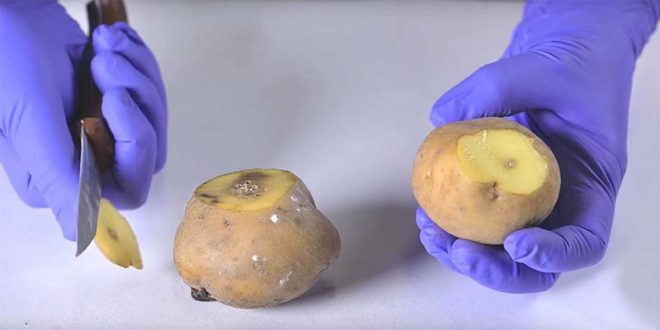Professor Jonathan Jones’ group at The Sainsbury Laboratory in Norwich has successfully developed PiperPlus 1.0, a late blight-resistant Maris Piper potato that is ready for commercialization once the UK implements workable regulation for crops improved through genetic modification (GM).
“PiperPlus 1.0 not only thrives without the weekly fungicide sprays required to control late blight, but it also has other qualities that will result in less food waste during production and a higher quality product for consumers,” according to a recent TSL article.
Some wild potato relatives, such as Solanum americanum, are resistant to blight. Jones’ team successfully isolated Solanum resistance genes and transferred three of them to the Maris Piper potato, conferring complete late blight resistance. This resulted in the creation of the PiperPlus project. The PiperPlus 1.0 potato is also resistant to tuber blight, a disease that affects tubers during storage and can result in significant losses after harvest.
PiperPlus 1.0 has additional tuber quality traits that will make it easier to store the potatoes without losing product quality. A project collaborator, Simplot, provided the technology to silence certain genes that cause cold-induced sweetening and tuber bruising. Reducing the amount of some sugars formed during cold storage means that the tubers will form less acrylamide during high-temperature cooking (such as frying or roasting).
“This will allow farmers to store potato tubers at low temperatures which prevent sprouting whilst maintaining high tuber quality,” the experts said.
Additionally, the lower propensity of these potatoes to bruise, which can happen at any stage from harvesting to processing, means that fewer tubers will be discarded and more will be available to eat.
“The main benefit of this technology is an environmental one”, says Jonathan Jones. “You have fewer fungicides in the environment, fewer tractors compacting soil, and burning diesel to release carbon dioxide. And because of improved tuber quality, you have much less food waste.”
Most potato varieties in the UK are PVY susceptible. Potato Virus Y is one of the most important viruses that affect potato production and is transmitted via sap-sucking aphids. The virus can be transmitted in potato tubers which means that if they are used as seed potatoes, the viral load will progressively increase.
Seed potatoes need to be certified as having very low levels of PVY. About 75% of the UK’s seed potatoes are grown in Scotland due to its cooler climate which reduces aphid populations. A PVY-resistant potato would mean that seed potatoes could be grown in warmer climates and that England would be able to produce its seed potatoes.
Jonathan Jones’ group in collaboration with their Polish colleagues from IBB PAS and IHAR Młochów isolated a PVY resistance gene from a wild potato relative, Solanum stoloniferum. The first PVY-resistant and blight-resistant PiperPlus 2.0 lines have already been planted in a field trial to test their performance.
Potato late blight caused the Irish Potato Famine in the 1840s and continues to plague UK farmers today. Much of the success in potato agriculture can be attributed to advancements in fungicide formulations and spray regimes, but these must be adjusted regularly as strains become insensitive or resistant to the chemicals.
A source: https://www.potatobusiness.com







